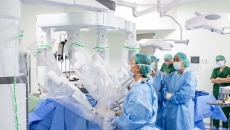Medical Devices
HIMSS25 APAC
Dr Tamara Sunbul, CIO of Fakeeh Care Group, emphasised certifications and training in telemedicine.
HIMSS25 APAC
Chang Gung Memorial Hospital, Linkou in Taiwan, only started to become a smart hospital after inspiring certain changes.
HIMSS25 APAC
Implementing wearable devices and AI technologies across its facilities in Banten is part of Bethsaida Healthcare's ongoing transformation, says corporate IT head Hasan Widjaja.
Siloam Hospitals has recently installed the robotic-assisted surgery system.
MedSecurance's Miroslaw Malinowski and Konstantinos Katzis say that helping IoMT device manufacturers ensure that their tools store and transmit data securely will encourage their use by patients and clinicians.
The Electronic Health Record Association wants Health and Human Services leaders to address conflicting rules for analytics tools, and also seeks clarity on electronic case reporting requirements.
HIMSS25 APAC
Meanwhile, Malaysia and China have started aligning and streamlining their medical device registrations through a first global regulatory reliance programme.
The Health Data Hub's Pauline Cohen explains that the SHAIPED project will assist AI-enabled medical device manufacturers in obtaining health data for model training while maintaining regulatory compliance.
Part of cybersecurity project ENTRUST's work will be open source so that at its conclusion its framework and assessments could possibly be integrated into the larger healthcare ecosystem, says Thanos Arvanitidis, the project's innovation project manager.
European legislation, workforce trends, women’s health, AI implementations, and more will be in the spotlight at HIMSS25 Europe at the Palais des Congrès de Paris, France on 10-12 June 2025.







